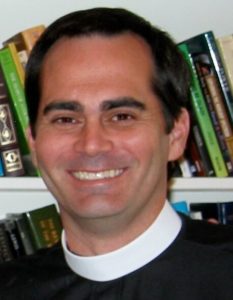 Youth is a powerful thing, especially for clergy in the Diocese of Central Florida.
Youth is a powerful thing, especially for clergy in the Diocese of Central Florida.
When Bishop Greg Brewer recently read an article about how ordained Episcopal clergy were getting older in the U.S., he knew right away that wasn’t indicative of his diocese.
“Bishop Brewer got worked up … and (we) revisited the files of the 14 candidates ordained to the priesthood or transitional diaconate between the dates of July 30, 2017, and September 9, 2017, to determine how old each of them is,” said Sarah Caprani, executive assistant to the bishop for the Diocese of Central Florida. “Bishop Brewer wanted to prove that although the national trend may be that clergy being ordained is getting older, in the Diocese of Central Florida the story is a much different one.”
Bishop Brewer’s hunch proved correct. Of the 14 priesthood track candidates ordained in the Diocese of Central Florida between July 30 and Sept. 9, a total of 57 percent (8 out of 14) are under the age of 45. Tracking further, research showed that 50 percent (7 of 14) are under the age of 40, and 21 percent (3 out of 14) are under the age of 35, Caprani said.
Those numbers are in stark contrast to nationwide research done by former All Saints Winter Park assistant rector Cameron Nations. His article, “The Future of the Episcopal Church’s Clergy” published in the Aug. 11, 2017, issue of “The Living Church” revealed that 40 percent of all clergy ordained were between the ages of 55 and 64, according to the Church Pension Group’s 2015 Church Compensation Report: A National, Provincial and Diocesan Analysis of Clergy Compensation.
“Bishop Brewer has emphasized leadership development from the beginning of his episcopacy,” said the Rev. Canon Dr. Justin Holcomb, Canon for Vocations for the Diocese of Central Florida. “Part of that emphasis is a conscious choice to seek out and raise up young leaders who will be able to learn from the many excellent clergy people we have, and to serve the church for years to come. The benefit of developing younger clergy is that they have more time to serve the church.”
The diocese’s trend toward younger clergy being ordained comes at a time when church attendance in TEC (The Episcopal Church) has dropped below 2 million, according to “The United States of America” by Jeremy Bonner. Consequently, church leaders are making efforts to find new ways to draw new parishioners to church.
One such way, particularly in the Diocese of Central Florida, is drawing younger individuals to the clergy in response to an interest in Jesus by younger generations.
“There are a variety of reasons the younger generations are getting involved locally (in the clergy),” Holcomb said. “One of the big ones is that there are young people out there who are passionate about Jesus and His church, and our diocese is making an intentional effort to raise them up and train them for leadership.
“Many young clergy cite the leadership of Bishop Brewer as a draw to the diocese,” Holcomb said. “He is eager and dedicated to developing good, young leaders.”
Getting more of the younger generation attracted to the clergy is a multistep process, Holcomb said. Few leaders just appear; rather, they need to be encouraged, mentored, and trained, he said.
“The first step is discipleship,” Holcomb said. “If we disciple our children, youth and young adults, they will grow into spiritual maturity at a younger age and they will be better equipped to serve God wherever He calls them, as lay people and as ordained clergy. Our existing leaders also need to look for leadership potential in their young parishioners and cultivate that very intentionally. Almost any ordained leader you ask will be able to tell you about someone who first encouraged them to pursue ordination. Also, the more focused the church is on kingdom-hailed mission, the more faithful leaders will emerge and want to participate.”
For now, the statistics show a younger clergy on the rise in Central Florida – and that’s something Holcomb feels good about in the years ahead.
“Going forward, the plan is not only to continue actively raising up leaders, both lay and ordained, from within our churches, but also to seek out those who are already following God’s call to leadership but need a diocesan home,” Holcomb said. “We are raising up leaders for the church for this generation; but, even more, for the future.”
